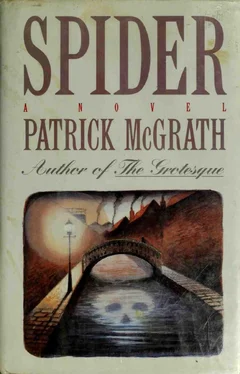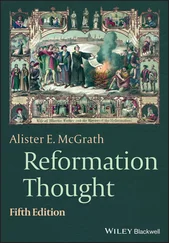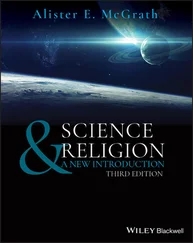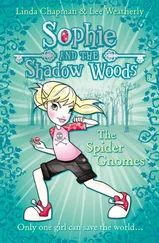I took to hanging about under the bridge by the canal, where it was dark. There was much in the visual world by this point that caused me terrible anxiety—I constantly had the sensation that some awful catastrophe was about to occur, and this feeling became at times so overpowering that I sank to the ground against the wall beneath the bridge and covered my eyes and ears with my arms. It was the fear I had of my father sending me to join my mother in Canada, it was the fear of being attacked with a gardening tool at the moment I least expected it. I attempted not to let them know what I knew but I could not sleep in number twenty-seven anymore, and I barely ate a thing, why would I? Why would I touch meat or vegetables prepared by Hilda? Their faces were changing now: I could see them eating, their jaws moving, their eyes shining in the kitchen’s gloom, their teeth closing on pieces of food, but each feature was fixed in space separate and distinct from the rest, and it was only by combining fragments of their broken-up faces and hands that I could keep them in focus and remain alert to their activity. They soon lost whatever veneer or crust of humanity they may once have had, and in their broken-up aspect they showed their true nature, their deadness and animality, and when I saw this the sensation of impending disaster almost overwhelmed me and I fled the kitchen in terror, heedless of their cries and squeals of frustrated hunger, for they planned to eat me, I’d realized, they planned to eat me up.
At night I grew calmer, partly as a function of darkness and partly because they were so often out of the house. Sometimes I followed them when they went to the Rochester, I watched them through the windows while they were at their drink, and when Hilda went to the Ladies I climbed on a barrel to see her pee. Other nights I stayed in the house and experimented with lengths of string dangled from my window down to the knob on the gas stove. Once when I was twitching the string and trying to get the knob to turn I felt my mouth fill up with small birds, which I crunched between my teeth, and then their feathers and blood and broken bones started to choke me, and I retched and retched but nothing came up. Another time I found a bottle of milk by the canal and in it was the putrefying corpse of a man my father had murdered the night before, and I opened the bottle and drank the milk. Another time I found a baby with a hole in the top of its head, and through the hole I sucked up and swallowed everything in the baby’s head until its face collapsed like an empty rubber mask. Later I remembered that this was how spiders devoured insects. That night I accidentally fell asleep and my father came in and compressed my skull with a plumber’s wrench, and when I woke up my head was pearshaped; this was so that it would fit the sack they’d prepared for me to be murdered in.
They grew hungrier and hungrier as the days passed, and I knew it would soon be time. When Hilda looked at me saliva dribbled from her mouth and ran down her primitive chin. My father was more furtive in his display of appetite, he watched me always from the corners of his eyes. His hands I noticed looked like paws now. Deadness and animality: I had no name for creatures like this, I still don’t despite the fact that one of them at this moment lies sleeping on the other side of the house, secure in the knowledge that her creatures in the attic (despite their occasional treachery) will preserve her from harm. Listen to them!
Listen to them. There is a rhythm to their activity, three distinct waves, each one rising and falling, each one separated from the last by a lull or hiatus during which I experience both relief and the torment of anticipating the next (the anticipation as intense as the wave itself). Each begins at the level of highest vehemence of the one preceding, so there is a massive increment of scale in volume and frenzy from the early part of the night to the later. And what is it that they do? Impossible to be precise: there is chanting and stamping, also hissing, screaming, cries and shouts that are only partially intelligible, gales of laughter, voices of people I have known saying wildly uncharacteristic things: Dr. Austin Marshall reciting filthy verses for example. They use my name freely, they play on it, they invert it: gelc, they call me, gelc, and recently they invented the chant: gelc SINNED gelc sinned gelc sinned gelc sinned gelc SINNED gelc sinned gelc sinned gelc sinned... They repeat it over and over, louder and louder, stamping all the while so the light bulb swings back and forth on its cord and I am plunged into shadow, then brought to lurid life, plunged into shadow, then back to lurid light—and I huddle on my chair with my legs drawn up to my chest and my head between my knees and my hands over my ears weeping weeping weeping as they push me to the very limits of what I can endure—then it breaks apart in screechy laughter—this gradually subsides, is followed by mumbling—and slowly I lift my head and catch trembling hold of the side of the table, perhaps pick up my pencil or roll a quick one while they gather themselves for the next— which begins, as I say, at the pitch of fiercest frenzy of the last!
Three waves, followed by exhaustion. Finally I rise from my chair and stand gazing out the window, gazing east to catch the first faint hint of dawn, and again I tell myself: no more. I wander through the sleeping house, past doors behind which dead souls dream. I patter down the stairs and into the kitchen, out into the hallway again, glance in Mrs. Wilkinson’s office—and it is then that I see them: on top of her desk, splayed there in the gloom, her house keys. Her house keys. A quiet cry of joy inside your old Spider as he silently crosses the room and in one smooth swooping movement pockets the bunch. Then off, in long spidery strides, back up the stairs, back to his room, unseen, unheard, unbound.
With my cardboard suitcase in my hand, and my three pound notes in my pocket, I turned for a last look at the gates of Ganderhill. Flanked by a pair of square towers, they were fifteen feet high and came to a sharp arch above which hung a huge clock that read one minute past ten. It was a fine clear morning, and the autumn sun was mellow on the bricks. A small door was set into the left-hand gate, and it was through this door that I had emerged. Mr. Thomas stood in the doorway; he was a senior attendant now, and had seen to the details of my discharge; he had also slipped me a couple of packets of Capstan Full Strength. He lifted his hand, I lifted mine; he stepped back in, and the door closed.
Somehow I found my way into the village and boarded the correct bus. I sat by a window and smoked; I gazed at the countryside as we rumbled toward London, attempting to control strong surges of bewilderment and loss that at times almost overwhelmed me. I felt, in a way, as I had after my mother’s death—the same sense of friendless isolation in a strange and threatening world. Twenty years in Ganderhill, how well I knew the place! Its courtyards and passageways, its gardens and outhouses—imbued, all of it, with the fleeting whisper of her presence, as she showed herself shyly to me, now and then, in the dappled shade of an elm tree, on a lonely terrace at dusk. And oh, the rhythms and rituals that governed the life there—in all of this I had a place, and was seen to have a place. As I sat there on that slow bus to London, among the housewives with their shopping bags, I knew with utter certainty that I could hope for no better than that, not me, not the old Spider; and now it was gone for good, for Jebb would never have me back, he’d made that clear enough. There was an ominous cast to my thoughts now, for I felt the first dim stirrings of approaching disaster—out there on the far horizon something large and black and dreadful was moving toward me. For what had I to give this world into which I’d been so abruptly thrust, and what had it for me?
Читать дальше












